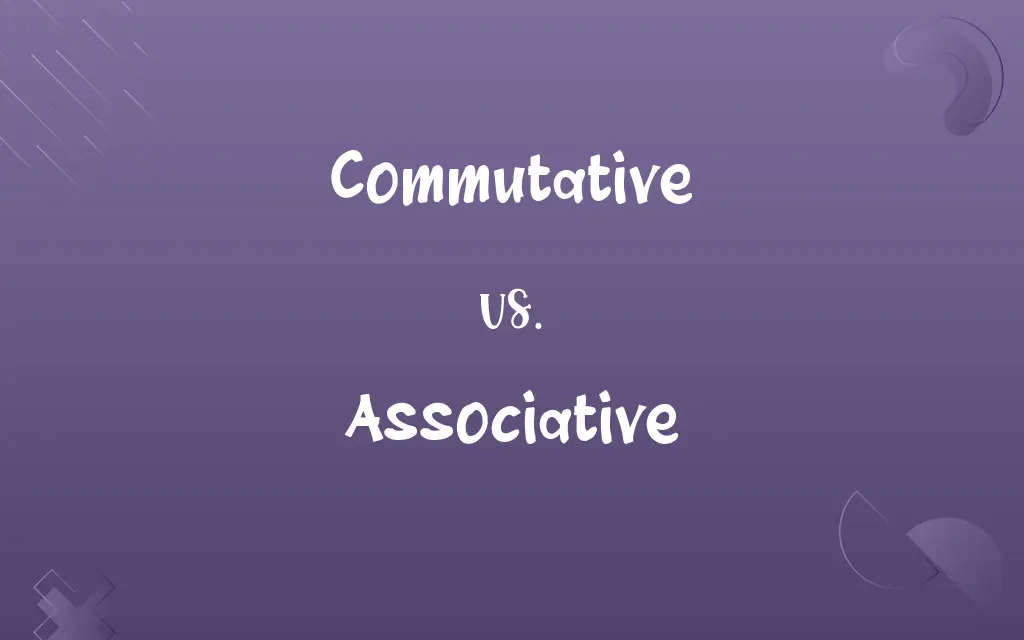Commutative vs. Associative: Know the Difference

By Shumaila Saeed || Published on January 8, 2024
Commutative refers to a property where the order of elements does not affect the result. Associative means grouping of elements does not change the outcome.

Key Differences
Commutative and Associative are two fundamental concepts in mathematics, specifically in the realm of operations like addition and multiplication. These concepts help us understand how numbers or elements interact with one another in different mathematical operations.
Shumaila Saeed
Jan 08, 2024
Commutative refers to the property where the order of operands in an operation does not affect the result. In the context of addition and multiplication, this means that changing the order of numbers being added or multiplied together will not change the final outcome. For example, in addition, 3 + 5 is commutative because it equals 5 + 3, and in multiplication, 2 × 4 is commutative because it equals 4 × 2. The commutative property holds true for these operations.
Shumaila Saeed
Jan 08, 2024
Associative, on the other hand, deals with how elements are grouped when performing an operation. It asserts that the grouping of elements in an operation does not change the final result. In the context of addition and multiplication, this means that when you have a sequence of operations involving three or more numbers, the result will remain the same regardless of how you group them with parentheses. For example, in addition, (2 + 3) + 4 is associative because it equals 2 + (3 + 4), and in multiplication, (1 × 2) × 3 is associative because it equals 1 × (2 × 3). The associative property holds true for these operations.
Shumaila Saeed
Jan 08, 2024
It's important to note that while both commutative and associative properties are relevant to addition and multiplication, they may not apply to all mathematical operations. Subtraction and division, for instance, do not exhibit these properties. Changing the order of numbers in subtraction or the grouping of numbers in division will usually yield different results.
Shumaila Saeed
Jan 08, 2024
In summary, the commutative property relates to the order of operands, indicating that it doesn't matter in which order you perform the operation, while the associative property deals with the grouping of operands, asserting that the grouping doesn't affect the outcome. These properties are fundamental to understanding how operations behave in mathematics and are particularly useful when dealing with algebraic expressions and simplifications.
Shumaila Saeed
Jan 08, 2024
ADVERTISEMENT
Comparison Chart
Definition
Order of elements doesn't affect outcome
Grouping of elements doesn't change outcome
Shumaila Saeed
Jan 08, 2024
Mathematical Operations
Applies to addition and multiplication
Applies to addition and multiplication
Shumaila Saeed
Jan 08, 2024
Non-Applicable Cases
Does not apply to subtraction and division
Generally applicable in arithmetic
Shumaila Saeed
Jan 08, 2024
Use in Algebra
Simplifies expressions by rearranging terms
Allows regrouping for simplification
Shumaila Saeed
Jan 08, 2024
Set Theory
Applies to union and intersection
Also applicable to union and intersection
Shumaila Saeed
Jan 08, 2024
ADVERTISEMENT
Commutative and Associative Definitions
Commutative
A mathematical property applicable to certain operations like addition and multiplication.
The equation 4 × 5 is commutative, as it equals 5 × 4.
Shumaila Saeed
Dec 20, 2023
Associative
In logic, referring to operations where the grouping of premises does not change the conclusion.
The statement if (A and B) and C, then D is associative, as if A and (B and C), then D leads to the same conclusion.
Shumaila Saeed
Dec 20, 2023
Commutative
In logic, referring to binary operations where the operands can be switched without changing the truth value.
The statement if A and B, then C is commutative, as if B and A, then C implies the same.
Shumaila Saeed
Dec 20, 2023
Associative
Relating to a situation where the grouping of elements in an operation does not alter the outcome.
In the expression (3 + 4) + 5, it is associative as 3 + (4 + 5) gives the same sum.
Shumaila Saeed
Dec 20, 2023
Commutative
Pertaining to a scenario where changing the order of elements does not affect the outcome.
In the equation 7 + 9, it is commutative as 9 + 7 yields the same result.
Shumaila Saeed
Dec 20, 2023
ADVERTISEMENT
Associative
A mathematical principle applicable to operations like addition and multiplication for regrouping terms.
The multiplication (2 × 3) × 4 is associative, as it equals 2 × (3 × 4).
Shumaila Saeed
Dec 20, 2023
Commutative
In set theory, an attribute of operations like union and intersection where the order of sets does not matter.
The union of sets A and B is commutative as A ∪ B equals B ∪ A.
Shumaila Saeed
Dec 20, 2023
Associative
A property in certain computational and logical processes where the way elements are combined or grouped does not matter.
In computing, the operation (data1 AND data2) AND data3 is associative, as data1 AND (data2 AND data3) produces the same result.
Shumaila Saeed
Dec 20, 2023
Commutative
A principle in certain physical and logical processes where the sequence of events or elements is irrelevant.
In the reaction of chemicals A and B, the commutative property states that A reacting with B is the same as B reacting with A.
Shumaila Saeed
Dec 20, 2023
Commutative
Relating to, involving, or characterized by substitution, interchange, or exchange.
Shumaila Saeed
Dec 13, 2023
Associative
(Mathematics) Independent of the grouping of elements. For example, if a + (b + c) = (a + b) + c, the operation indicated by + is associative.
Shumaila Saeed
Dec 13, 2023
Commutative
Independent of order. Used of a logical or mathematical operation that combines objects or sets of objects two at a time. If a × b = b × a, the operation indicated by × is commutative.
Shumaila Saeed
Dec 13, 2023
Associative
Pertaining to, resulting from, or characterised by association; capable of associating; tending to associate or unite.
Shumaila Saeed
Dec 13, 2023
Commutative
Such that the order in which the operands are taken does not affect their image under the operation.
Addition on the real numbers is commutative because for any real numbers , it is true that .
Addition and multiplication are commutative operations but subtraction and division are not.
Shumaila Saeed
Dec 13, 2023
Associative
Such that, for any operands and , ; (of a ring, etc.) whose multiplication operation is associative.
Shumaila Saeed
Dec 13, 2023
Associative
(computing) Addressable by a key more complex than an integer index.
Associative memories were once given considerable attention.
Shumaila Saeed
Dec 13, 2023
Commutative
Such that any two sequences of morphisms with the same initial and final positions compose to the same morphism.
Shumaila Saeed
Dec 13, 2023
Associative
Having the quality of associating; tending or leading to association; as, the associative faculty.
Shumaila Saeed
Dec 13, 2023
Commutative
Relative to exchange; interchangeable; reciprocal.
Rich traders, from their success, are presumed . . . to have cultivated an habitual regard to commutative justice.
Shumaila Saeed
Dec 13, 2023
Associative
Characterized by or causing or resulting from association;
Associative learning
Shumaila Saeed
Dec 13, 2023
Associative
In set theory, a characteristic of operations like union and intersection where the grouping of sets is irrelevant.
The intersection of sets (A ∩ B) ∩ C is associative as it equals A ∩ (B ∩ C).
Shumaila Saeed
Dec 20, 2023
Commutative
Of a binary operation; independent of order; as in e.g.
A x b = b x a
Shumaila Saeed
Dec 13, 2023
Repeatedly Asked Queries
Can the associative property be used in division?
No, the associative property does not generally apply to division.
Shumaila Saeed
Jan 08, 2024
Does the associative property apply to addition?
Yes, the associative property applies to addition.
Shumaila Saeed
Jan 08, 2024
Are all mathematical operations commutative?
No, operations like subtraction and division are not commutative.
Shumaila Saeed
Jan 08, 2024
Can the associative property be observed in set theory?
Yes, it applies to operations like union and intersection in set theory.
Shumaila Saeed
Jan 08, 2024
Is subtraction commutative?
No, subtraction is not commutative. For example, 5 - 3 is not the same as 3 - 5.
Shumaila Saeed
Jan 08, 2024
Are all logical operations commutative?
No, not all logical operations are commutative. It depends on the specific operation.
Shumaila Saeed
Jan 08, 2024
Does the associative property help in simplifying algebraic expressions?
Yes, it allows for regrouping terms for easier simplification.
Shumaila Saeed
Jan 08, 2024
Is the commutative property applicable in geometry?
It's more relevant in arithmetic and algebra than in geometry.
Shumaila Saeed
Jan 08, 2024
Is the commutative property relevant in physics?
It can be, particularly in quantum mechanics and certain physical reactions.
Shumaila Saeed
Jan 08, 2024
Is multiplication always commutative?
Yes, in basic arithmetic, multiplication is always commutative.
Shumaila Saeed
Jan 08, 2024
Are there exceptions to the commutative property in set theory?
Generally, no, especially for basic operations like union and intersection.
Shumaila Saeed
Jan 08, 2024
Can associative be used in computing algorithms?
Yes, especially in parallel computing and data processing.
Shumaila Saeed
Jan 08, 2024
Can the commutative property be applied to matrices?
Matrix multiplication is not commutative.
Shumaila Saeed
Jan 08, 2024
Is the associative property useful in statistical calculations?
It can be, particularly in simplifying complex statistical formulas.
Shumaila Saeed
Jan 08, 2024
Are there real-world examples where associative is essential?
Yes, in financial calculations, programming, and data analysis, associative property often plays a key role.
Shumaila Saeed
Jan 08, 2024
How is the associative property used in everyday math?
It's used in simplifying calculations by changing the grouping of numbers.
Shumaila Saeed
Jan 08, 2024
Is associative important in logical reasoning?
Yes, especially in constructing and understanding complex logical arguments.
Shumaila Saeed
Jan 08, 2024
Can the commutative property be broken?
In certain advanced mathematical contexts, yes, but generally it holds for addition and multiplication.
Shumaila Saeed
Jan 08, 2024
Do all computer algorithms utilize the commutative property?
Not all, but many algorithms, especially those involving arithmetic operations, do.
Shumaila Saeed
Jan 08, 2024
Does associative apply to all algebraic structures?
It applies to many, but not necessarily all, depending on the operation.
Shumaila Saeed
Jan 08, 2024
Share this page
Link for your blog / website
HTML
Link to share via messenger
About Author
Written by
Shumaila SaeedShumaila Saeed, an expert content creator with 6 years of experience, specializes in distilling complex topics into easily digestible comparisons, shining a light on the nuances that both inform and educate readers with clarity and accuracy.









































































